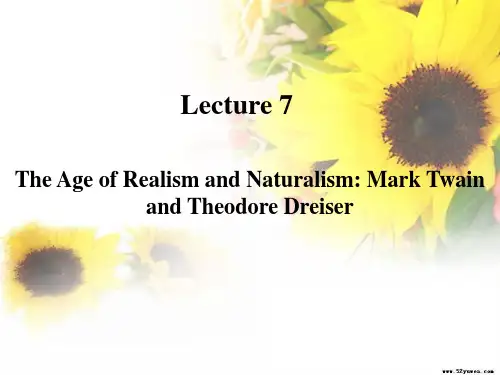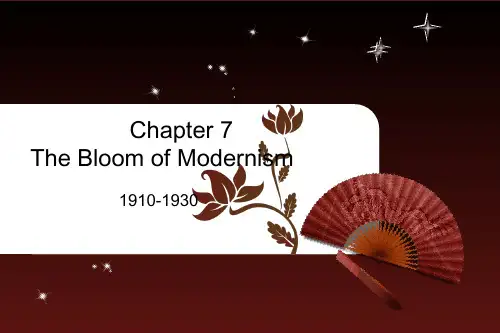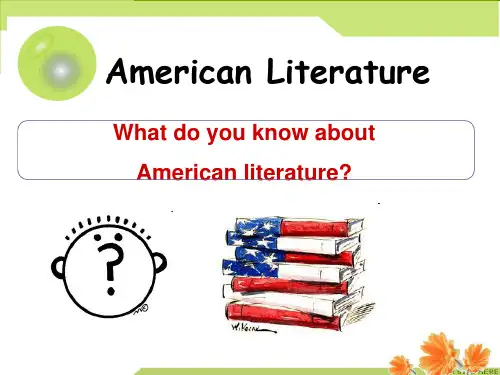美国文学史及作品选读Unit 7
- 格式:ppt
- 大小:2.53 MB
- 文档页数:26

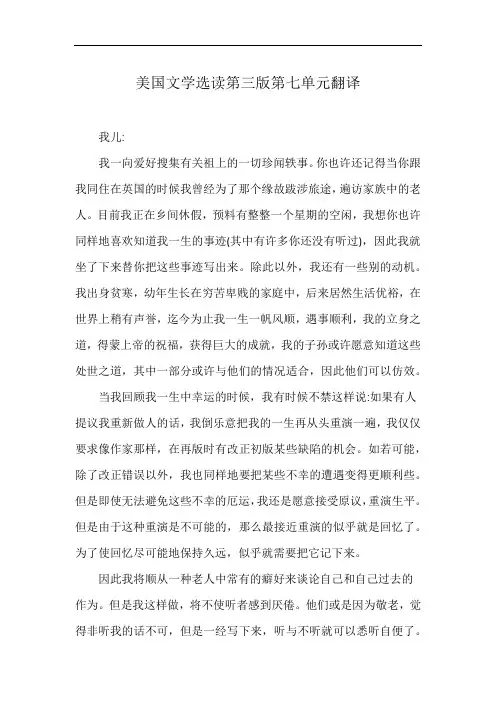
美国文学选读第三版第七单元翻译我儿:我一向爱好搜集有关祖上的一切珍闻轶事。
你也许还记得当你跟我同住在英国的时候我曾经为了那个缘故跋涉旅途,遍访家族中的老人。
目前我正在乡间休假,预料有整整一个星期的空闲,我想你也许同样地喜欢知道我一生的事迹(其中有许多你还没有听过),因此我就坐了下来替你把这些事迹写出来。
除此以外,我还有一些别的动机。
我出身贫寒,幼年生长在穷苦卑贱的家庭中,后来居然生活优裕,在世界上稍有声誉,迄今为止我一生一帆风顺,遇事顺利,我的立身之道,得蒙上帝的祝福,获得巨大的成就,我的子孙或许愿意知道这些处世之道,其中一部分或许与他们的情况适合,因此他们可以仿效。
当我回顾我一生中幸运的时候,我有时候不禁这样说:如果有人提议我重新做人的话,我倒乐意把我的一生再从头重演一遍,我仅仅要求像作家那样,在再版时有改正初版某些缺陷的机会。
如若可能,除了改正错误以外,我也同样地要把某些不幸的遭遇变得更顺利些。
但是即使无法避免这些不幸的厄运,我还是愿意接受原议,重演生平。
但是由于这种重演是不可能的,那么最接近重演的似乎就是回忆了。
为了使回忆尽可能地保持久远,似乎就需要把它记下来。
因此我将顺从一种老人中常有的癖好来谈论自己和自己过去的作为。
但是我这样做,将不使听者感到厌倦。
他们或是因为敬老,觉得非听我的话不可,但是一经写下来,听与不听就可以悉听自便了。
最后(我还是自己承认了好,因为即使我否认,别人也不会相信),写自传,或许还会大大地满足我的自负心。
说句老实话,我时常听见或在书上读到别人在刚说完了像“我可以毫不自夸地说……”这种开场白以后,接着就是一大篇自吹自擂的话。
大多数人不喜欢别人的虚夸,不管他们自己是多么自负。
但是无论在什么地方,我对这种自负心总是宽宥的。
因为我相信这种心理对自己和他四周的人都有好处。
所以,在许多情况下,一个人如果把自负心当作生命的慰藉而感谢上帝,这也不能算是怪诞悖理的。
自传既然我提到了上帝,我愿意十分谦恭地承认,上面提到的我过去一生中的幸福当归功于上帝仁慈的旨意,上帝使我找到了处世之道,并且使这些方法获得成功。
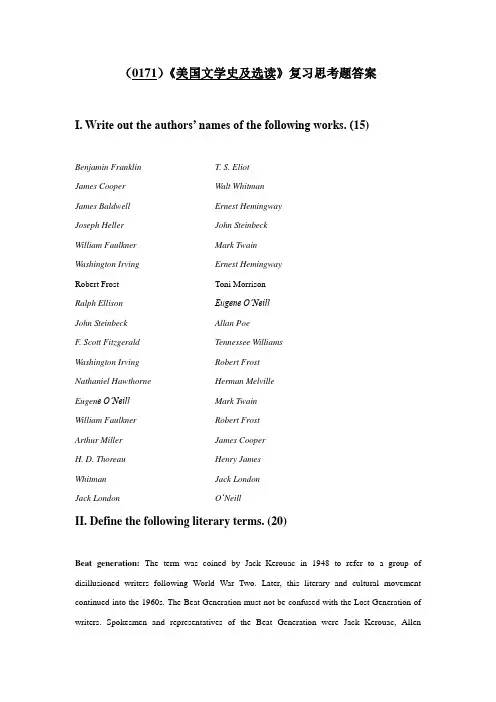
(0171)《美国文学史及选读》复习思考题答案I. Write out the authors’ names of the following works. (15)Benjamin Franklin T. S. EliotJames Cooper Walt WhitmanJames Baldwell Ernest HemingwayJoseph Heller John SteinbeckWilliam Faulkner Mark TwainWashington Irving Ernest HemingwayRobert Frost Toni MorrisonRalph Ellison Eugene O’NeillJohn Steinbeck Allan PoeF. Scott Fitzgerald Tennessee WilliamsWashington Irving Robert FrostNathaniel Hawthorne Herman MelvilleEugen e O’Neill Mark TwainWilliam Faulkner Robert FrostArthur Miller James CooperH. D. Thoreau Henry JamesWhitman Jack LondonJack London O’NeillII. Define the following literary terms. (20)Beat generation:The term was coined by Jack Kerouac in 1948 to refer to a group of disillusioned writers following World War Two. Later, this literary and cultural movement continued into the 1960s. The Beat Generation must not be confused with the Lost Generation of writers. Spokesmen and representatives of the Beat Generation were Jack Kerouac, AllenGinsberg and others. They revolted against an America that was materialistic, belligerent and frustrating. Social, intellectual and sexual freedom was advocated. Traditional culture and normal social behavior were attacked and violated. Many of them were drug addicts wearing long hair and dirty clothes. They were fond of slangs and jazz. Masterpieces created by writers of this group include Kerouac‟s On the Road and Ginsberg‟s Howl and Other Poems, which were regarded as pocket Bibles of that generation. Other prominent Beats include William S. Burroughs, Lawrence Ferlinghetti, Gregory Corso, Michael McClure, and Neal Cassady. The Beat Generation, had greatly influenced the countercultural movements of the 1960s and the adolescents and adults in other countries. In England, the “angry young men” made an echo and imitated the American “beatnik.”Protagonist: the principal character in a play or story; the central character who serves as a focus fo r the work‟s themes and incidents and as the principal rationale for its development; and one who is opposed to the antagonist. In the beginning of ancient Greek drama, there were only a chorus and one actor—the leader of the chorus. Thespis invented the first actor. Then Aeschylus and Sophocles added the second and third actors to the tragedy respectively. The three actors were names Protagonist, Deuteragonist and Tritagonist. In discussions of modern literature, the protagonist is sometimes referred to as the hero or anti-hero.Biography:an account of a person‟s life written by somebody else, or biographical writing as a form of literature.Novel: Generally speaking, it is an imaginative prose narrative of extended length dealing with fictional characters and events. The constituent elements of a novel include plot, character, conflict, and setting. But there can be exceptions. Some novels are short. Some novels are not fictional. Some novels are in verse. And some novels do not even tell a story. There have been many debates over the appropriate length of a novel. No established length for a novel has been agreed upon. It is generally held, however, that a full-length novel is longer than a novella or short novel, and a short novel is longer than a shot story. A novel should be long enough so as to appear in print in an independent volume. The great length of a novel makes it possible for the characters and themes in it to be developed more fully and subtly.Antihero: a main character in a story, novel, play or film who behaves in a completely different way from what people expect a hero to do. A non-hero is without the qualities and features of atraditional or old-fashioned hero. He is doomed to fail. Antiheroes of early days were Don Quixote, Macbeth, Rip V an Winkle, and Tristram Shandy. Examples of antiheroes in modern literature include Leopold Bloom, Jim Dixon, Jimmy Porter, Herzog, and Y assarian.Free verse:a form of poetry without rhyme, meter, regular line length, and regular stanzaic structure. It depends on natural speech for rhythm. Robert Frost compared it to “playing tennis with the net down.” Though much simpler and less restrictive than conventional poetry and blank verse, free verse does no mean “formlessness.” T. S. Eliot once said that “no verse is free for the man who wants to do a good job.” Though its origin is unknown, it was attempted by such early poets as Surrey, Milton, Blake, and Macpherson. It was Whitman who did the greatest contribution to the development and popularity of free verse. Whitman favored the simplicity and freedom of expression. According to him, “The art of art, the glory of expression and the sunshine of light of letters is simplicity. Noting is better than simplic ity.”Drama: a form of literature written for actors to perform. A drama is divided into acts. An act can be subdivided into scenes. The constituent elements of a drama include dialogue, plot, characters, setting, stage direction, and others. A drama can be as long as three parts called trilogy, or as short as one act only. Greek drama originated in religious ceremonial in honor of Dionysus. Medieval drama developed out of rites celebrating the life events of Jesus Christ. Dramatists of great importance in literary history include Sophocles, Shakespeare, Ibsen, and Shaw. In America, the firs important dramatist was Eugene O‟Neill who wrote the first serious plays. Before O‟Neill, America had theatre. Starting from O‟Neill, it began to have drama.Jazz age: Jazz is a form of dance music that is derived from early Afro-American folk music, ragtime, and Negro blues. It is marked with exciting rhythm, pronounced syncopation, and constant improvisation. The musical instruments used are mainly drums, trumpets, and saxophones. Major composers of Jazz music include Irvin Berlin and W. C. Handy. The term Jazz Age was specifically employed by Fitzgerald to denote the 1920s, which was characterized by the loss of traditional moral standards, indulgence in romantic yearnings, and great social excitement. According to Malco lm Cowley, the Jazz Age was “a legend of glitter, of recklessness, and of talent in such profusion that it was sown broadcast like wild oats.” F. Scott Fitzgerald‟s Tales of the Jazz Age, like Mark Twain‟s The Gilded Age, was an epoch-making work.Autobiography: a story a writer writes about his or her own life experiences. It is narrated fromthe first-person point of view. The term was probably first used by Southey. But the first important autobiography was Confessions written by Augustine of Hippo. Othe r examples include Franklin‟s Autobiography, Adams‟s The Education of Henry Adams, John Stuart Mill‟s Autobiography, Carlyle‟s Reminiscences, Henry David Thoreau‟s Walden, and so on. Sometimes, an autobiography can be fictionalized. An example of this kind is Rousseau‟s Confessions. Some novels and long poems are used for autobiography. Joyce‟s A Portrait of the Artist as a Young Man, Whitman‟s “Song of Myself” and Wordsworth‟s The Prelude fall in this category. Dickens‟s David Copperfield, Lawrence‟s Sons and Lovers and O‟Neill‟s Long Day’s Journey into Night have strong autobiographical elements in them.Blank verse: poetry that does not rhyme but has iambic pentameter lines. Though not originated in England or America, it has been the most important and most widely used English verse form. Blank verse is popular because it is closest to the rhythm of daily English speech. Thus most English poems which are dramatic, reflective or narrative are in the form of blank verse. This verse was probably first used in England by Surrey who translated Aeneid, by Sackville and Norton who composed Gorboduc. It was developed and perfected by Marlowe, Shakespeare and Milton. In the 18th century, most poets favored heroic couplets. But Y oung and Thomson were able to write in the tradition of blank verse. The 19th century saw a renewed interest in this poetic form. Masters of blank verse included Wordsworth, Coleridge and Bryant. The fact that blank verse is still practiced by writers like T.S. Eliot, Y eats, Frost and Stevens shows how influential and favorable it really is.Black humor:a term frequently used in modern literary criticism. It is sometimes called …black comedy‟ or …tragic farce.‟ It is humor or laughter resulting from great pain, despair, horror and the absurdity of human existence. Black humor is a common quality of modern anti-novels and anti-dramas. Examples are Franz Kafka‟s stories like “Metamorphosis”, “The Castle” and “The Trial”, Joseph Heller‟s novel Catch-22and Albee‟s The Zoo Story. Other writers who did much contribution to the popularity of black humor were Beckett, Camus, Ionesco, V onnegut, Pynchon and so on.Head rhyme: the use in verse or prose of several words close together which all begin with the same letter. It is done for special musical effect comparable to the effects of end rhyme. In mostcases, alliteration is the repetition of identical initial consonant sounds. Examples are Pope‟s “For fools rush in where angels fear to tread,” Poe‟s “The weary, wayworn wanderer bore,” and Coleridge‟s“Five miles meandering with a mazy motion.” Alliteration of initial vowels is quite limited in number. An example of vowel alliteration is “It is impossible to enjoy idling thoroughly unless one has plenty of work to do.”Surprise Ending:Also called “O. Henry ending,” it is a completely unexpected turn or revelation of events at the conclusion of a story or play. An example is “The Necklace” by Guy de Maupassant. Another instance is O. Henry‟s story “The Gift of the Magi.”III. Give brief answers to the following questions. (15)1.Who is the father of American literature? (Consult your book)2.Who is the father of American poetry? (Consult your book)3.What is Poe‟s theory concerning poetry? (Consult your book)4.What is Poe‟s theory concerning the short story? (Consult your book)5.What are the major characteristics of Twain‟s writing style? (Consult your book)6.What are the major characteristics of Irving‟s writing style? (Consult your book)7.What is “black humor? (Consult your book)8.What is the Harlem Renaissance? (Consult your book)9.What is the New England Renaissance? (Consult your book)10.What are the major characteristics of colonial American literature? (See your book)11.What is the Lost Generation? (Consult your book)12.What are Benjamin Franklin‟s contributions to A merican culture? (See your book)13.Why is colonial American literature neither American nor literary? (See your book)14.What is the Jazz Age? (Consult your book)15.What is American transcendentalism? (Consult your book)16.What is imagism? (Consult your book)17.What is O. Henry Ending? (Consult your book)18.What is free verse? (Consult your book)IV. Read the following poem and try to understand and explain it.(20)FogTHE FOG comesOn little cat feet.It sits lookingOver harbor and cityOn silent haunchesAnd then moves on(An imagist poem by Carl Sandburg; depicting the fog and its movement; free verse written in the tradition of Whiman.)In a Station of the Metro(Ezra Pound)The Apparition of these faces in the crowd;Petals on a wet, black bough.( a poem of the Imagist school, written by Ezra Pound.)The Road Not T aken(By Robert Frost)TWO roads diverged in a yellow wood,And sorry I could not travel bothAnd be one traveler, long I stoodAnd looked down one as far as I couldTo where it bent in the undergrowth;Then took the other, as just as fair,Though as for that, the passing thereHad worn them really about the same,And both that morning equally layIn leaves no step had trodden black.Oh, I kept the first for another day!Y et knowing how way leads to way,I doubted if I should ever come back.I shall be telling this with a sighSomewhere ages and ages hence:Two roads diverged in a wood, and I-I took the one less traveled by,And that has made all the difference.(A poem by Robert Frost. It is about the difficulty of making a choice.)Dreams(by Langston Hughes)Hold fast to dreamsFor if dreams dieLife is a broken-winged birdThat cannot fly.Hold fast to dreamsFor when dreams goLife is a barren fieldFrozen with snow.(Consult your book)。
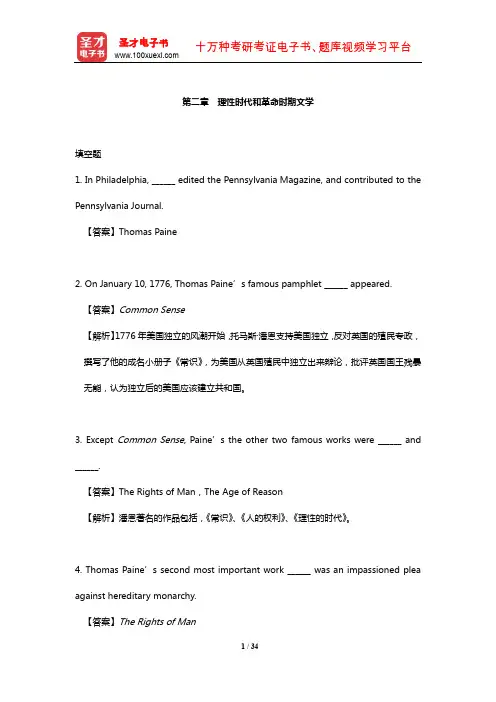
第二章理性时代和革命时期文学填空题1. In Philadelphia, ______ edited the Pennsylvania Magazine, and contributed to the Pennsylvania Journal.【答案】Thomas Paine2. On January 10, 1776, Thomas Paine’s famous pamphlet ______ appeared.【答案】Common Sense【解析】1776年美国独立的风潮开始,托马斯·潘恩支持美国独立,反对英国的殖民专政,撰写了他的成名小册子《常识》,为美国从英国殖民中独立出来辩论,批评英国国王残暴无能,认为独立后的美国应该建立共和国。
3. Except Common Sense, Paine’s the other two famous works were______ and ______.【答案】The Rights of Man,The Age of Reason【解析】潘恩著名的作品包括,《常识》、《人的权利》、《理性的时代》。
4. Thomas Paine’s second most important work ______ was an impassioned plea against hereditary monarchy.【答案】The Rights of Man【解析】1791年3月,托马斯·潘恩在伦敦出版《人权论》,激烈抨击埃德蒙·伯克(Edmund Burke,1729-1797)的《法国革命感言录》(Reflections on the Revolution in France)(1790)。
《人权论》的可贵之处还在于,它冲破了当时笼罩于整个西方思想界对英国君主立宪政体的迷信,深入骨髓地批判了这一政体,给当时还处于摸索状态的法国革命指明了共和主义的崭新方向。
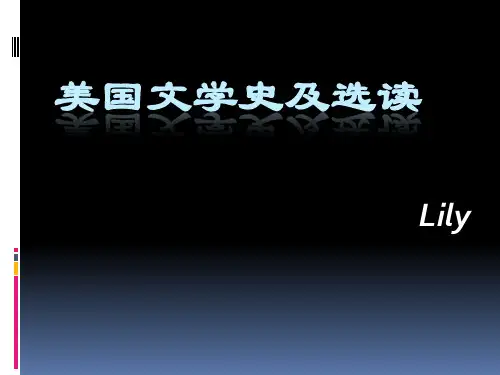
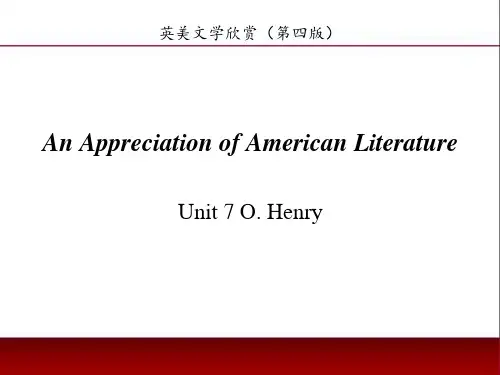
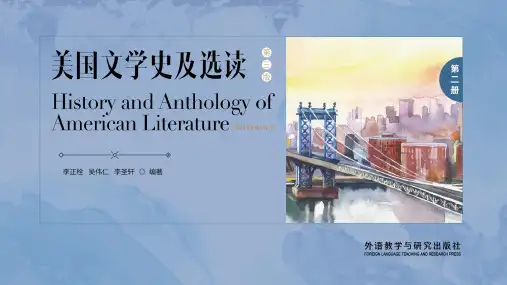
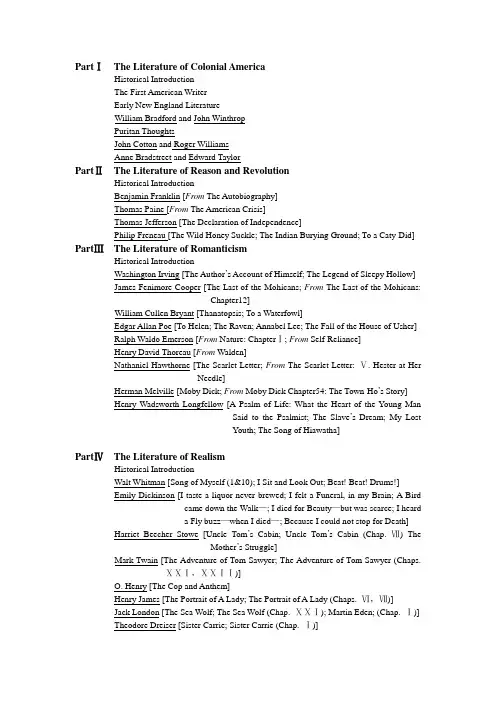
PartⅠThe Literature of Colonial AmericaHistorical IntroductionThe First American WriterEarly New England LiteratureWilliam Bradford and John WinthropPuritan ThoughtsJohn Cotton and Roger WilliamsAnne Bradstreet and Edward TaylorPartⅡThe Literature of Reason and RevolutionHistorical IntroductionBenjamin Franklin [From The Autobiography]Thomas Paine [From The American Crisis]Thomas Jefferson [The Declaration of Independence]Philip Freneau [The Wild Honey Suckle; The Indian Burying Ground; To a Caty-Did] PartⅢThe Literature of RomanticismHistorical IntroductionWashington Irving [The Author’s Account of Himself; The Legend of Sleepy Hollow]James Fenimore Cooper [The Last of the Mohicans; From The Last of the Mohicans:Chapter12]William Cullen Bryant [Thanatopsis; To a Waterfowl]Edgar Allan Poe [To Helen; The Raven; Annabel Lee; The Fall of the House of Usher]Ralph Waldo Emerson [From Nature: ChapterⅠ; From Self-Reliance]Henry David Thoreau [From Walden]Nathaniel Hawthorne [The Scarlet Letter; From The Scarlet Letter: Ⅴ. Hester at HerNeedle]Herman Melville [Moby Dick; From Moby Dick Chapter54: The Town-Ho’s Story]Henry Wadsworth Longfellow [A Psalm of Life: What the Heart of the Young ManSaid to the Psalmist; The Slave’s Dream; My LostYouth; The Song of Hiawatha]PartⅣThe Literature of RealismHistorical IntroductionWalt Whitman [Song of Myself (1&10); I Sit and Look Out; Beat! Beat! Drums!]Emily Dickinson [I taste a liquor never brewed; I felt a Funeral, in my Brain; A Birdcame down the Walk—; I died for Beauty—but was scarce; I hearda Fly buzz—when I died—; Because I could not stop for Death]Harriet Beecher Stowe [Uncle Tom’s Cabin; Uncle Tom’s Cabin (Chap. Ⅶ) TheMother’s Struggle]Mark Twain [The Adventure of Tom Sawyer; The Adventure of Tom Sawyer (Chaps.ⅩⅩⅠ,ⅩⅩⅠⅠ)]O. Henry [The Cop and Anthem]Henry James [The Portrait of A Lady; The Portrait of A Lady (Chaps. Ⅵ,Ⅶ)]Jack London [The Sea Wolf; The Sea Wolf (Chap. ⅩⅩⅠ); Martin Eden; (Chap. Ⅰ)]Theodore Dreiser [Sister Carrie; Sister Carrie (Chap. Ⅰ)]PartⅤTwentieth-Century LiteratureHistorical IntroductionEzra Pound [A Virginal; Salutation the Second; A Pact; In a Station of the Metro; TheRiver-Merchant’s Wife: A Letter]Edwin Arlington Robinson [The House on the Hill; Richard Cory; Miniver Cheevy]Robert Frost [After Apple-Picking; The Road Not Taken; Stopping by Woods on aSnowy Evening; Departmental; Design; The Most of It]Carl Sandburg [Chicago; The Harbor; Fog; Cool Tombs; Flash Crimson; The People,Yes]Wallace Stevens [Peter Quince at the Clavier; Anecdote of the Jar; The Emperor ofIce-cream]Thomas Stearns Eliot [The Song of J. Alfred Prufrock; PreludesⅠ—Ⅳ; Journey of theMagi; The Hollow Men]F. Scott Fitzgerald [The Great Gatsby; The Great Gatsby (Chap. Ⅲ)]Ernest Hemingway [A Farewell to Arms; A Farewell to Arms (Chap. XLI)]John Steinbeck [The Grapes of Wrath; The Grapes of Wrath (XXIII)]William Faulkner [A Rose for Emily]。
